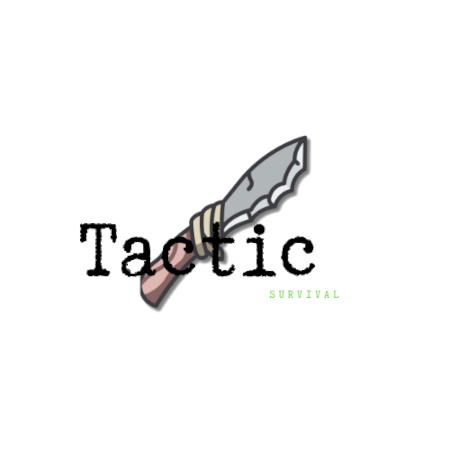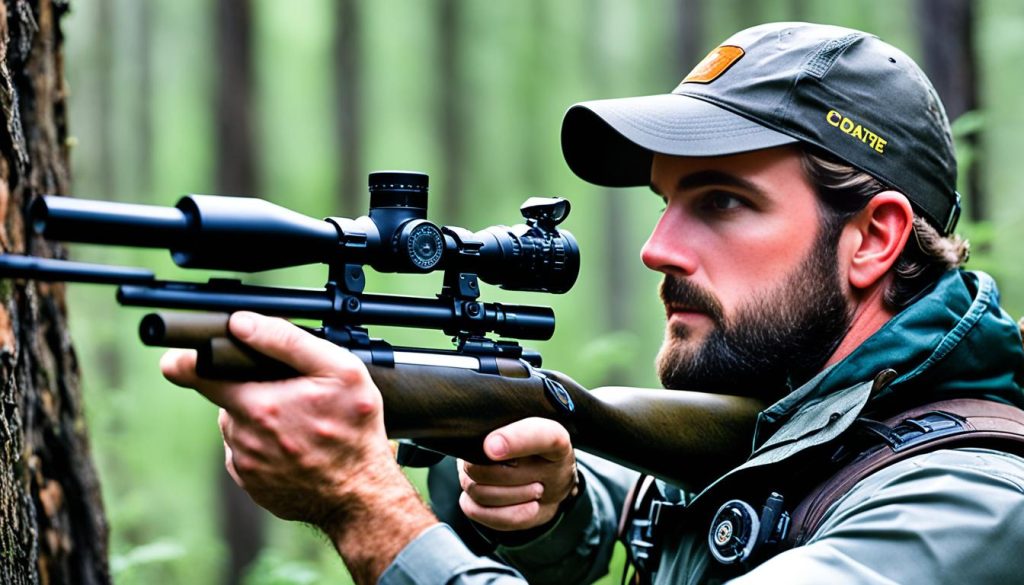Did you know that being responsible, knowing safety, and handling firearms well are key for hunting to survive? This is how we make sure hunting can continue and thrive.
Hunter education is very important. It teaches us to be responsible, improves our skills and knowledge, and gets more people hunting. By focusing on being safe and responsible, hunters help keep their sport honorable.
Key Takeaways:
- Responsible behavior, safety skills, and knowledge of firearm handling are crucial for the survival and sustainability of hunting.
- Hunter education plays an essential role in instilling responsibility and improving skills and knowledge.
- Prioritizing safety and responsible hunting behavior contributes to the preservation of hunting as a respected sport.
The Importance of Responsibility in Hunting
Being a responsible hunter is all about acting ethically and with respect. It’s more than just following hunting laws. It means having good manners and valuing others, the wildlife, and our environment.
Responsible hunting involves treating fellow hunters and landowners with kindness. It’s about acting with honesty, following ethical hunting methods, and showing deep respect for animals. Good hunters know their actions represent all of us and shape hunting’s future.
“Hunting responsibly includes caring for the land and animals. It means following hunting laws, learning about the animals we hunt, and valuing the ethics of a fair chase.”
Hunters must avoid poaching and illegal hunting. Poaching harms the future of wildlife and gives hunting a bad name. It’s important to hunt in a way that respects nature and ensures there are animals for future hunters.
Patience is a vital part of ethical hunting. Waiting for the right, clean shot is crucial. Hunters must know when to shoot and when to let the animal go. Aiming for a humane and ethical kill is very important.
Folloing hunting laws is crucial. These laws protect hunters and nature. Hunters should know the rules about how many animals they can catch, when they can hunt, and how to hunt different animals.
“Hunting laws help protect wildlife and their homes. As good hunters, we must follow these laws to guard our forests and fields.”
In conclusion, hunting with respect and ethics is about keeping nature, animals, and people safe. By following the rules and showing care for the environment, hunting can continue in a way that is good for everyone.
Image:
Developing Safety Skills
Safety is key in hunting. It’s crucial to learn safety skills for a great, careful time. This part covers hunting safety, gun holding, and safe gun use.
The Importance of Hunting Safety
Hunting safety is vital to avoid accidents and keep everyone safe. Before going out, make sure you’ve had training and practice. You must know the hunting rules and how to use guns safely.
“Safety is not an accident; it is a result of knowledge and responsible actions.”
Learning hunting safety helps reduce accidents and makes hunting look good. Skilled hunters can teach newcomers to be safe.
Firearm Handling and Safe Gun Operation
Gun safety includes knowing how guns work and how to care for them. Learning to handle guns right is a big part of staying safe.
Experts say to always treat guns like they’re loaded. Keep the gun away from yourself and others. Also, hold the gun properly, don’t touch the trigger until you’re ready to shoot, and make sure you know what you’re shooting at.
Knowing how to use guns safely cuts the chance of accidents. This way, you protect everyone around you while hunting.
Remember, with the power to use a gun comes a big responsibility. It’s on every hunter to make safety their top concern. By honing safety skills and handling guns the right way, hunters can have fun out there. They do this while keeping themselves and others safe.
The Importance of Knowledge in Firearm Safety
Knowledge is key for safe gun use and hunting. Knowing the basics of how to handle guns safely is very important. It helps avoid accidents, keeping everyone safe.
Understanding a gun’s functions is crucial. This means getting to know its parts, how it works, and its safety features. You must also learn how to load, unload, and clear your gun safely.
Hunters also need to be skilled in safe handling. They should know the proper way to carry, store, and transport their guns. These practices not only prevent accidents but also support a good view of hunting and gun ownership.
Knowing the law about hunting is also necessary. Hunters should understand the rules in their area. This includes when to hunt, how many animals you can hunt, and which areas are off-limits. Being informed helps hunters stay legal and protect wildlife.
Gun safety knowledge is critical. It gives hunters the tools to use firearms without harm. This keeps themselves, others, and nature safe. Learning about guns and hunting laws shows a hunter’s dedication to doing things right.
| Benefits of Firearm Knowledge | Safe Gun Handling Techniques | Hunting Regulation Understanding |
|---|---|---|
| Prevents accidents and promotes safety | Carry firearm safely | Abide by hunting laws |
| Promotes a positive image of hunting | Store firearm securely | Know permitted hunting seasons |
| Contributes to wildlife conservation efforts | Transport firearm responsibly | Understand bag limits |
The Role of Involvement in Responsible Hunting
Responsible hunting is more than just the hunt. It’s about keeping hunting a respected sport, working with others. This includes teaching, talking to landowners, and working with nature groups to keep wildlife safe.
It’s important to teach new hunters. Tell them why being ethical, safe with guns, and caring for the environment matters. By sharing what you know, you help make sure hunting skills and respect for nature are passed on.
This also means getting to know the people who own the land where you hunt. Landowners help manage the wildlife. They might let you hunt if they know you’re helping keep the land and animals safe. This way, hunters and landowners work together for a good cause.
Groups that look out for nature are key, too. Working with them gives hunters the chance to help out in big ways. These groups help in many ways, like fixing wildlife homes or making new ones. They also protect areas where animals live. By being part of these groups, hunters have a big role in taking care of the places they love to hunt in.
Following the rules is super important, too. Laws are there to protect the animals and the sport. If hunters obey the rules and work well with those who make sure rules are kept, it’s better for everyone. This shows we respect the sport and the nature we hunt in.
To sum up, hunting the right way means doing more than just hunting. It means teaching others, helping with the land, and joining with groups that care. By doing all this, hunters ensure the sport they love is kept safe and respected, for nature and for future hunters.
Firearms Handling Best Practices
It’s crucial to handle guns responsibly to keep everyone safe. No matter your experience, following safe handling practices is key. It helps avoid accidents and encourages safe gun use. This way, everyone in the hunting community stays safer.
Always Point the Muzzle in a Safe Direction
Keeping the muzzle pointed safely is rule number one. Never point the gun at things you don’t plan to shoot. This simple step helps prevent accidents and keep others safe.
Treat Every Firearm as if it’s Loaded
Always think a gun is loaded, even if you’re sure it’s not. Treating it with respect prevents accidents. This mindset makes sure you always handle guns safely.
Ensure Proper Identification of the Target and What’s Beyond
“Paying close attention to your target and what lies beyond it is crucial in preventing accidents and ensuring responsible gun use.” – John Smith, experienced hunter
Know what you’re shooting at and what’s behind it before you pull the trigger. This avoids hurting anyone or damaging anything with stray bullets. Taking your time keeps everyone safe.
Keep Fingers Outside the Trigger Guard until Ready to Shoot
Proper trigger discipline is vital. Keep your finger off the trigger until you’re sure about shooting. This simple step stops accidental shots.
Hunters learn these valuable habits by always practicing safety. Making these habits natural keeps the hunting experience safe for all.
To wrap up, always handle guns safely and use them responsibly. These practices help hunters avoid accidents, protect everyone, and boost safety in the hunting world. Remember, using guns wisely is about more than personal safety. It’s about showing respect for the hunting tradition.
Essential Hunting Skills and Survival Strategies
Learning hunting and survival is key for safe and ethical hunting. Hunters need good skills to find game, shoot well, and survive outdoors. This way, they can enjoy their time in nature while staying safe.
Advanced Hunting Techniques
To get close to game silently, hunters use advanced techniques. Some of these are:
- Still Hunting: This involves moving quietly, stopping to look and listen for animals.
- Stalking: Hunters slowly approach animals, staying hidden and low.
- Spot-and-Stalk: Hunters spot game from afar, then sneak closer for a shot.
- Stand Hunting: This means waiting quietly in one spot, like a tree stand, for animals to appear.
- Tracking: Hunters follow animal tracks to find and predict their movements.
By learning these techniques, hunters can be more successful and enjoy hunting even more.
Marksmanship and Shot Placement
Being a good shooter is essential for hunting. Hunters should practice shooting to be accurate and confident.
It’s also very important to know where to shoot an animal to make the kill quick and humane. A successful shot means the animal feels less pain and dies swiftly.
Outdoor Survival Skills
Survival skills are a must for hunters in the wild. Knowing how to navigate, build shelters, start fires, find water, and give basic first aid is crucial. These skills help hunters stay safe and handle emergencies in the wild.
By focusing on these skills, hunters can have better hunting trips. They’ll be safer and more likely to succeed while hunting ethically.
Conclusion
Learning how to hunt safely and knowing firearm safety is crucial for a fun and secure hunting trip. Over half (61 percent) of firearm owners in the U.S. have taken safety classes. This shows many people understand the need for safe gun use.
In a recent survey, 74 percent of American adults agreed that tests for carrying concealed guns should include safety and legality checks. It highlights how important it is for gun owners to know the correct and legal ways to handle guns.
Knowing how to handle guns safely is vital. But, you also need the right equipment. Learning about using hunting gear safely is just as important. This knowledge helps you use your guns responsibly and safely.
It’s not just about knowing how to use guns. Keeping up with safe hunting methods is key, whether you’re just starting out or have been hunting for a while. Many places in the U.S. require safety classes before you can buy or carry a gun. This includes States and the District of Columbia. It shows a big focus on making sure hunters and gun owners know how to use guns safely.


